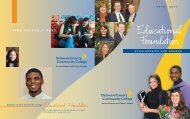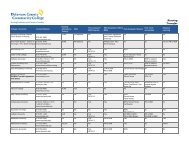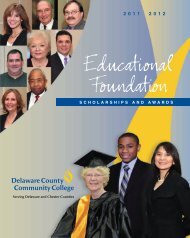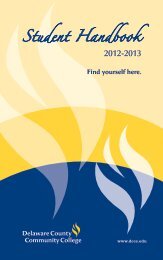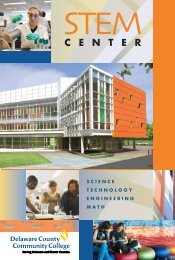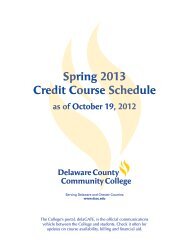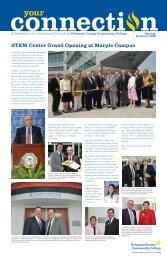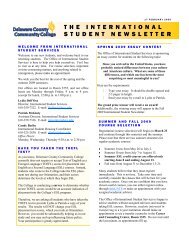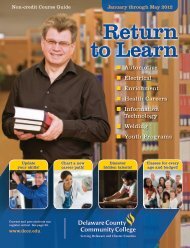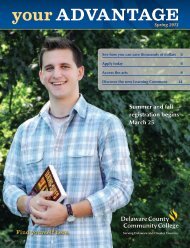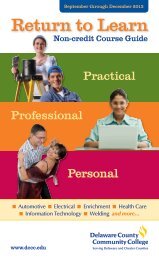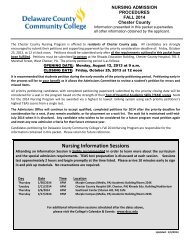2010 Catalog - Delaware County Community College
2010 Catalog - Delaware County Community College
2010 Catalog - Delaware County Community College
Create successful ePaper yourself
Turn your PDF publications into a flip-book with our unique Google optimized e-Paper software.
COURSE DESCRIPTIONS 105<br />
• Explain how elasticity and utility modify goods<br />
allocations.<br />
• Relate short-run and long-run costs to the production<br />
decisions of firms.<br />
• Distinguish and comparatively evaluate perfect<br />
competition, monopoly, monopolistic competition and<br />
oligopoly in terms of cost curves, profit maximizing and<br />
economic goals.<br />
• Show how the factor markets are affected by supply,<br />
demand, economic rent, interest and profit.<br />
• Explain market failure through the interaction of public<br />
and private sectors of the economy where externalities,<br />
public goods, poverty and growth are involved.<br />
• Assess the significance of international trade and finance<br />
for the U.S. and world economics.<br />
Prereq. MAT 060<br />
3 Credits 3 Weekly Lecture Hours<br />
(EDU) Education<br />
EDU 110 - Introduction to Teaching<br />
This course provides students with an introduction to the<br />
field of teaching and learning. Students will become familiar<br />
with teaching as a career choice and state requirements for<br />
becoming a certified teacher. The foundations history and<br />
philosophy of education will be examined and students will<br />
gain an understanding of modern education in our society.<br />
Students will also examine the impact of current issues on<br />
American education today. To assist students in gaining<br />
knowledge in a well organized format, the course is structured<br />
into four areas of competence: historical and philosophical<br />
foundations; teachers and students; schools and<br />
curriculum; and finances, government, and legal concerns.<br />
Upon successful completion of this course, students<br />
should be able to:<br />
• Develop background in early childhood education<br />
foundations, theory and policy, including understanding<br />
current issues with historical and philosophical<br />
background including inclusionary practices. (PDE<br />
Competencies)<br />
• Develop background in early childhood education<br />
foundations, theory and policy, including understanding<br />
social, economic and cultural diversity, and implications<br />
for learning. (PDE Competencies)<br />
• Develop background in early childhood education<br />
foundations, theory and policy, including general and<br />
professional ethics. (PDE Competencies)<br />
• Demonstrate understanding of the way in which<br />
classroom environments influence children’s learning<br />
including the connection between classroom materials,<br />
learning standards, and instruction. (PDE Competencies)<br />
• List the advantages and disadvantages of teaching as a<br />
career choice.<br />
• Understand how teachers develop a professional<br />
reputation and obtain employment.<br />
• Describe and utilize the resources at <strong>Delaware</strong> <strong>County</strong><br />
<strong>Community</strong> <strong>College</strong> that will assist them in achieving<br />
their career goal including advising, Career Center,<br />
Program Guides, resource meetings, Media Center, and<br />
PRAXIS information.<br />
• Develop a statement of their philosophy of teaching and<br />
learning that is research based.<br />
• Understand the diversity of students and student needs<br />
(educational, social, cultural, behavioral) and the<br />
responsibility of a classroom teacher to these needs.<br />
• Understand and analyze the major developments of<br />
the history of education, especially as they relate to<br />
school reform.<br />
• Use resources at DCCC to plan their educational program,<br />
choose a transfer institution, and identify the steps they<br />
need to take to complete a teacher education program.<br />
• Become a more reflective learner, with particular regard<br />
to personal skills and attitudes as they compare and<br />
contrast their readiness with the vocation of becoming a<br />
classroom teacher today.<br />
• Comprehend the practical aspects of education, including<br />
governance, politics, funding, law, and societal impacts.<br />
• Identify and involve oneself with the early childhood<br />
field. (NAEYC Standard, 5a)<br />
• Know about and uphold ethical standards and other<br />
professional guidelines. (NAEYC Standard, 5b)<br />
• Engage in continuous, collaborative learning to inform<br />
practice. (NAEYC Standard, 5c)<br />
Prerequisite: ENG 050 and REA 050 or pass test<br />
3 Credits 3 Weekly Lecture Hours<br />
EDU 205 Strategies for Effective<br />
Classroom Management<br />
This course will review the major theories of effective<br />
classroom management and the various models of effective<br />
classroom discipline. The course maintains that effective<br />
discipline must be taught, and it occurs in a collaborative<br />
school culture.<br />
Upon successful completion of the course, students<br />
should be able to:<br />
• Evaluate, analyze, and synthesize ideas from a variety<br />
of research sources and formulate a preventative model<br />
of classroom management.<br />
• Analyze a classroom environment for effective classroom<br />
management strategies.<br />
• Apply critical thinking and information literacy<br />
strategies to understand the concepts of an effective<br />
classroom environment.<br />
• Demonstrate an understanding of effective teaching.<br />
Prereq. EDU 200<br />
3 Credits 3 Weekly Lecture Hours<br />
EDU 206<br />
Technology in Education<br />
This course is a one-semester introduction to the use<br />
of computers in the elementary and secondary school<br />
classroom with an emphasis on successfully integrating<br />
technology-based materials to enhance student learning.<br />
The course will combine educational theory with computerbased<br />
activities to complement major course concepts.<br />
In addition, a course website will be used to encourage<br />
communication and information sharing among course<br />
participants.<br />
Upon successful completion of the course, students<br />
should be able to:<br />
• Increase knowledge of computers, networking,<br />
the Internet and World Wide Web as they relate to<br />
K-12 education.<br />
• Identify appropriate methods of evaluating websites and<br />
software applications. Describe current instructional<br />
principles, research and appropriate assessment practices<br />
as related to the use of computers and technology<br />
resources in the curriculum.<br />
• Discuss and critique issues related to use of computers in<br />
education, including security, equity, copyright and ethics<br />
of using the Internet in the classroom. Construct<br />
appropriate applications of technology to specific<br />
instructional situations.<br />
• Design or develop appropriate instructional technologybased<br />
applications.<br />
• Name appropriate professional development resources for<br />
maintaining currency in the field.<br />
• Use techniques involved in developing technology-based<br />
instructional materials in various formats.<br />
Prereq. DPR 100<br />
3 Credits 3 Weekly Lecture Hours<br />
EDU 207<br />
Foundations of Literacy, PK4<br />
This course is designed to prepare students for teaching<br />
reading using a balanced approach of various theoretical<br />
teaching models based on current research and knowledge.<br />
Through readings, lectures and class activities, students<br />
will develop a solid understanding of the reading process<br />
and how to construct and manage a classroom environment<br />
that promotes optimal literacy learning. Students will<br />
acquire knowledge about how to meet the diverse needs of<br />
learners at all stages of literacy development. In addition,<br />
students will learn how to formally and informally assess<br />
students to monitor reading progress and plan appropriate<br />
reading instruction.<br />
Upon successful completion of this course, students<br />
should be able to:<br />
• Develop a philosophy of reading that reflects knowledge of<br />
the major theories of literacy development and instruction.<br />
• Understand that literacy is a developmental process that<br />
is emergent and continuously involved.<br />
• Demonstrate understanding of how personal beliefs and<br />
histories influence the teaching of reading<br />
• Develop instructional activities that would engage students<br />
in shared reading, reading aloud, guided reading, shared<br />
writing, interactive writing and word study.<br />
• Observe, identify, learn and practice the different models<br />
and strategies for teaching comprehension instruction.<br />
• Observe, identify, learn and practice the different models<br />
and strategies for teaching work study instruction.<br />
• Understand how technology can be integrated into<br />
literacy instruction.<br />
• Design balanced literacy instruction that includes<br />
listening, speaking, reading comprehension, writing,<br />
vocabulary and word study activities.<br />
• Use assessments to make informed decisions in literacy<br />
instruction.<br />
• Implement strategies for infusing literacy across content<br />
areas in a balanced literacy format.<br />
• Organize time, space, materials, and activities for<br />
differentiated literacy instruction in ulticultural/<br />
multiethnic classrooms<br />
3 Credits 3 Weekly Lecture Hours<br />
EDU 215 Theory and Field Experience<br />
In Elementary Education<br />
This course will provide an orientation to various aspects<br />
of teaching in K-6 schools. Topics will include curriculum,<br />
planning, effective instruction, discipline, and the structure<br />
of the school. Field experiences will be related to course<br />
topics. Students will complete 36 hours of observation in<br />
the field. Field Experience will give students the opportunity<br />
to visit schools and classrooms prior to student<br />
teaching to observe and reflect on the principles and<br />
practices learned in the college classroom. Furthermore,<br />
students will come in contact with children having varying<br />
needs and educational issues.<br />
Upon successful completion of the course, students<br />
should be able to:<br />
• Describe the structures that support school programs,<br />
including personnel roles, classroom organization,<br />
and resources.<br />
• Explain the role of curriculum, and various ways of<br />
effectively teaching it to students.<br />
• Demonstrate an understanding of the role of the<br />
classroom teacher on a daily basis and as a professional.<br />
• Demonstrate an understanding of the factors that support<br />
a safe and positive classroom climate, and how to create it.<br />
• Describe the role and functions of the State Department<br />
of Education.<br />
Prereq. ENG 112, PSY 140, EDU 200<br />
3 Credits 3 Weekly Lecture Hours<br />
EDU 220<br />
Introduction to Special<br />
Education<br />
This course will provide an introduction to the field of<br />
special education and the major provisions of special<br />
education regulations and law. It will also review the<br />
major needs of students with disabilities and how to plan<br />
instruction for them. Students will learn the uses for<br />
various kinds of assignments and adaptations to meet the<br />
needs of specialized population in K-12 schools.<br />
Upon successful completion of this course, students<br />
should be able to:



